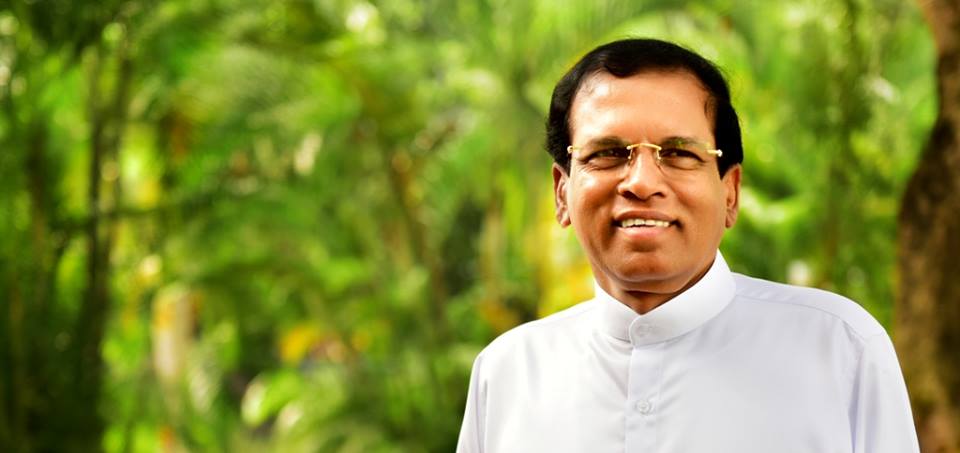A Brief Colonial History Of Ceylon(SriLanka)
Sri Lanka: One Island Two Nations
A Brief Colonial History Of Ceylon(SriLanka)
Sri Lanka: One Island Two Nations
(Full Story)
Search This Blog
Back to 500BC.
==========================
Thiranjala Weerasinghe sj.- One Island Two Nations
?????????????????????????????????????????????????Friday, November 30, 2018
Maithripala Sirisena, The Bane Of Rajapaksa’s Political Existence

By Rasika Jayakody –NOVEMBER 28, 2018
 President Maithripala Sirisena is many things to many people. But he has only been a bane to former President Mahinda Rajapaksa.
President Maithripala Sirisena is many things to many people. But he has only been a bane to former President Mahinda Rajapaksa.
It was Sirisena, who, leading an alliance representing a wide spectrum
of political parties and civil organizations, defeated the seemingly
invincible Rajapaksa in January 2015.
After a brief period in the political wilderness, Rajapaksa bounced back
strongly, forming a political party of his own that pulled off an
unexpected victory at the last Local Government Council election.
And, as of October 26, 2018, it seemed that Rajapaksa was at the zenith
of his popularity, poised to win the next Parliamentary election with a
sweeping majority.
In fact, it can be said, that both President Maithripala Sirisena and ousted Prime Minister Ranil Wickremesinghe have covertly helped Rajapaksa regain momentum through their shortsighted actions and ineffectual governance.
Then Sirisena made his most monumental blunder. He allowed Rajapaksa in
through the backdoor one night, and stealthily appointed him the Prime
Minister. At the time, Rajapaksa’s group had no concerns about a
parliamentary majority, naively assuming they were in the driving seat.
President Sirisena’s repeated assurances had convinced them to such a
degree, they had even expected a section of hardcore UNP MPs to perform a
somersault and support Rajapaksa’s appointment. A source familiar with
the discussions that took place with the two groups implied that
Sirisena and S.B. Dissanayake had presented Rajapaksa with a list of 14
UNP MPs who they assumed would cross over to support the “overnight”
regime change they architected.
Things, however, went horrifically wrong, when Sirisena’s grand promises
failed to materialise. All their attempts to purchase MPs and engineer
mass crossovers bore no fruit, as the majority of UNP MPs stood their
ground, supporting Wickremesinghe.
In fact, MP Palitha Rangebandara recorded his conversations with
Sirisena’s go-betweens and released them to the public, causing the
former President and his camp a great deal of embarrassment In all,
Sirisena failed to fulfil his end of the deal, leaving Rajapaksa
stranded, with a crown on his head but with his hands and legs tied.
With the Supreme Court staying the Gazette dissolving Parliament,
Rajapaksa was forced to return to Parliament where he suffered two
humiliating no-confidence motions backed by four of the six political
parties represented in the legislature. In the absence of a simple
majority, Rajapaksa’s only way out was to architect an early dissolution
of Parliament by creating continuous chaos in the House and disrupting
proceedings. This was indeed a long shot as all political parties saw
through their plan and adopted counter-strategies. As a result, their
plan backfired and the unruly behaviour of pro-Rajapaksa MPs drew
scathing criticism from the public. With all of this, the pendulum of
public sympathy suddenly swung in favour of the UNP.
On the canvas of public perception, Rajapaksa has now been painted as an
unlawful Prime Minister, avoiding Parliament merely because he does not
have a majority. The widely circulated photographs of UPFA MPs throwing
books and chilli powder at police officers have caused irreparable
damage to the former President’s political agenda. Their excuses for
avoiding Parliament and for their forcible continuation in office
without a simple majority in Parliament have causedthe Rajapaksa group
to be reviled in the eyes of the international press. Adding insult to
injury, no country, with the exception of Burundi, has accepted the
legitimacy of the purported administration and diplomats from key
missions have warned of targeted punitive actions against those
responsible for the protracted political turmoil in Sri Lanka.
The current situation has left former President Rajapaksa in a
politically precarious position. Presiding over a fragile government
lacking legitimacy, he has also earned criticism from his own ranks for
being so naive as to accept premiership. Leading the MPs criticising Rajapaksa from within his ranks is Kumara Welgama, a long-time Rajapaksa ally and a key architect of the “pohottuwa”
movement. Meanwhile, there are reports that a section of SLFP MPs, led
by national organiser Duminda Dissanayake, have held discussions with
former President Chandrika Bandaranaike Kumaratunga to form an
independent group in Parliament. Although Rajapaksa’s appointment as the
Prime Minister was strategically positioned as a move to ‘unite’ the
Sri Lanka Freedom Party, it has, in fact, widened the divisions in the
party.
Many now opine that the MPs around Rajapaksa, who are to face a surfeit
of cases in court, pressured him into accepting the premiership, in a
desperate bid to slow the wheels of justice. This may have been one
reason why Rajapaksa entered a seemingly strange alliance with Sirisena.
It is my view, however, that Rajapaksa made a grave strategic
miscalculation, based on overly ambitious promises and assurances by
Sirisena and his allies.
In his haste to oust Wickremesinghe and the UNP faction of the
government, Sirisena also spoiled Rajapaksa’s chances for 2020 and
pushed him into a disadvantageous position in the eyes of the public.
Even at this point, Rajapaksa believes a parliamentary election will
hold a favourable outcome for him and give him a relatively honourable
exit route from the current rut he is in. But while Rajapaksa is still a
force to reckon with at a parliamentary election, he is now much weaker
than he was before October 26. The uncharacteristically defensive
statement he issued on Sunday (25) explaining his reasons for remaining
in the government indicates his current vulnerability.

